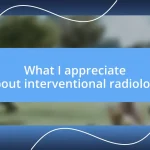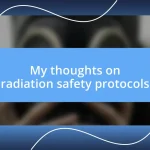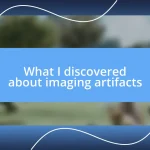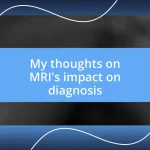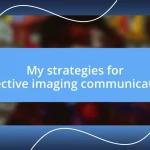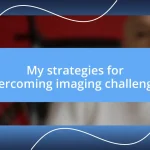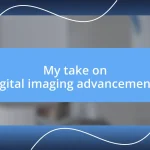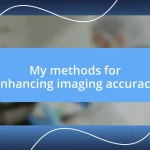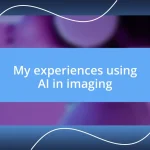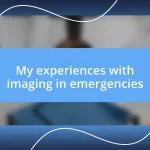Key takeaways:
- Understanding and navigating a rare genetic disorder often involves self-advocacy, emotional resilience, and building a support network of friends and patient advocacy groups.
- Connecting with patient advocacy groups provides vital resources, emotional support, and a sense of belonging, greatly aiding those with rare conditions in their journeys.
- Sharing personal experiences on platforms like social media raises awareness and fosters connections, helping to illuminate the struggles faced by individuals with rare genetic disorders.

Introduction to Rare Genetic Disorders
Rare genetic disorders affect countless individuals yet are often misunderstood and overlooked. I remember when I first encountered someone grappling with a condition that few others had heard of; it was a poignant reminder of how much we still need to learn about these unique experiences. Have you ever wondered how it feels for someone to live with a diagnosis that sets them apart from the mainstream?
These disorders arise from genetic mutations, which can be incredibly complex and varied. Some may present with symptoms that are mild, while others can profoundly impact daily life. This range is what makes rare disorders particularly intriguing yet challenging. Reflecting on my experiences, I can’t help but feel a mix of admiration and empathy for those copiously navigating their world, often while facing a lack of understanding from those around them.
The rarity of these disorders means that data and support can be scarce, which often leads to feelings of isolation for those affected. I’ve seen friends struggle to find resources, and it breaks my heart knowing that some people might feel forgotten in their journeys. Isn’t it astonishing that in our interconnected world, so many still stand alone with their challenges?

Understanding My Diagnosis Journey
Understanding my journey with diagnosis involved a lot of emotions and unexpected twists. It started with vague symptoms that my doctors initially dismissed, leaving me feeling frustrated and confused. I remember sitting in the waiting room, anxious and scared, wondering if I’d ever find clarity about my health.
As the journey progressed, I had to advocate for myself, often feeling like a detective piecing together a challenging puzzle. I vividly recall that moment when I finally received the diagnosis; it was a mix of relief and fear. Relief because I had an answer after so long, but fear when confronted with the reality of what that diagnosis meant for my life moving forward.
The process wasn’t just about medical testing; it involved emotional resilience and the support of understanding friends and family. I recall late-night conversations with my best friend, who listened patiently as I shared my fears. The isolation I felt was profound, especially when I learned that few understood my condition. How do we find connection in such solitude? For me, it became essential to seek support networks and connect with others facing similar challenges, transforming my journey into one filled with shared experiences.
| Key Aspect | My Experience |
|---|---|
| Initial Symptoms | Vague and dismissed by doctors |
| Emotional Response | Frustration and confusion |
| Breakthrough Moment | Receiving the diagnosis |
| Support Network | Communication with friends and family |
| Overall Journey | A mix of apprehension and hope |

Seeking Medical Support and Resources
Finding the right medical support when navigating a rare genetic disorder can feel like searching for a needle in a haystack. I recall calling various specialists, only to hear their offices were unfamiliar with my condition. The frustration mounted, but I learned quickly how indispensable the right resources can be. Connecting with genetic counselors and patient advocacy groups played a crucial role in my journey. They provided not only information but also emotional support—something I desperately needed.
To streamline your search for medical support, consider these steps:
- Research Specialists: Look for doctors with experience in rare genetic disorders, especially those who have published research or are part of specialized clinics.
- Consult Genetic Counselors: They can provide valuable insights, resources, and emotional support tailored to your specific situation.
- Leverage Patient Advocacy Groups: These organizations can connect you with others living with similar conditions, offering both practical advice and community.
- Participate in Clinical Trials: They may not only provide access to cutting-edge treatments but also help you connect with experts in the field.
- Utilize Online Resources: Websites, forums, and social media can be excellent tools for information and support, allowing you to share experiences with others in similar circumstances.
With a strategy in place, reaching out for assistance will feel less daunting. You’ll be amazed by the vibrant communities and wealth of information ready to support you on your journey.

Coping Strategies for Daily Life
Coping with daily life while managing a rare genetic disorder requires a unique set of strategies that I’ve found invaluable. One approach that helped me tremendously was creating a daily routine that prioritized my health needs. Each morning, I would dedicate time to prepare healthy meals and engage in gentle exercises, which infused a sense of normalcy into my day. Isn’t it amazing how small habits can lead to significant changes?
Another effective strategy I implemented was journaling my thoughts and experiences. Writing down my feelings not only acted as an emotional outlet but also allowed me to track my symptoms and triggers. I still remember how cathartic it felt to release my worries onto the pages, transforming some of that chaos into clarity. Engaging in this practice turned my anxiety into insights, guiding me on my path.
Building a supportive network was also crucial. I sought out online communities, where I found individuals who truly understood my struggle. One night, as I shared my latest challenges in a forum, I was met with an outpouring of empathy and encouragement. It made me realize that I wasn’t alone in this journey. Isn’t it comforting to know that others have walked a similar path and can offer advice or simply a listening ear? These connections have become a cornerstone for not just coping but thriving amid the complexities of life with a rare disorder.

Connecting with Patient Advocacy Groups
Connecting with patient advocacy groups was a game changer for me. I remember attending my first local support meeting, feeling hesitant yet hopeful. As I walked in, I was welcomed by warm smiles and shared stories that mirrored my own struggles. Has there ever been a moment when you felt an immediate sense of belonging? That’s exactly how it felt. These groups not only provided me with vital information about my condition but also introduced me to friends who understood the complexities I faced daily.
Through various advocacy organizations, I discovered a treasure trove of resources that I never knew existed. I got connected with mentors who had navigated similar pathways, offering insights on managing care and optimizing treatment options. One particular conversation with a fellow patient stands out in my memory; she told me how advocating for herself led to better healthcare experiences. Isn’t it fascinating how sharing stories can empower others? That shared knowledge inspired me to take charge of my own advocacy efforts.
Ultimately, the relationships I built through these groups became a pillar of strength for me. Whenever I had a question or faced a new challenge, I found solace in reaching out to my newfound friends. I still remember the excitement of learning about an upcoming awareness campaign, which I eagerly joined, feeling like I was part of something bigger than myself. Do you ever wonder how much strength we can draw from community? For me, these interactions turned into a lifeline during difficult times, reinforcing the idea that together, we can amplify our voices for greater recognition and support for rare genetic disorders.

Sharing My Story for Awareness
Sharing my story has been a pivotal aspect of raising awareness about rare genetic disorders. I vividly recall one evening when I decided to share my journey on social media, holding my breath as I pressed “post.” The flood of responses was overwhelming; friends and even acquaintances reached out with heartfelt messages of support. Wasn’t it incredible to realize that my vulnerability could connect with others in such a meaningful way? Suddenly, I was not just an individual with a rare condition—I had transformed into a voice for many.
The more I shared, the more I found other individuals who had been through similar experiences. I distinctly remember a late-night conversation with someone I had never met. As we swapped stories, it struck me how sharing our struggles created an instant bond. Isn’t it fascinating how common narratives can foster understanding and empathy? Every story exchanged resonated deeply, shedding light on topics that often remain in the shadows. By sharing my experience, I learned that each of us, in our unique ways, has the power to educate and inspire change.
Ultimately, awareness is a collective effort. I took part in a local awareness event, and as I spoke about my journey, I could see the engagement in the audience’s eyes. It became crystal clear that sharing my story was not just about my personal journey but also about lighting the way for others. Have you ever thought about the impact your story could have on someone else’s life? Witnessing the ripple effect of understanding and support reminded me that together, we can create a broader conversation around rare genetic disorders, enriching the lives of so many.
